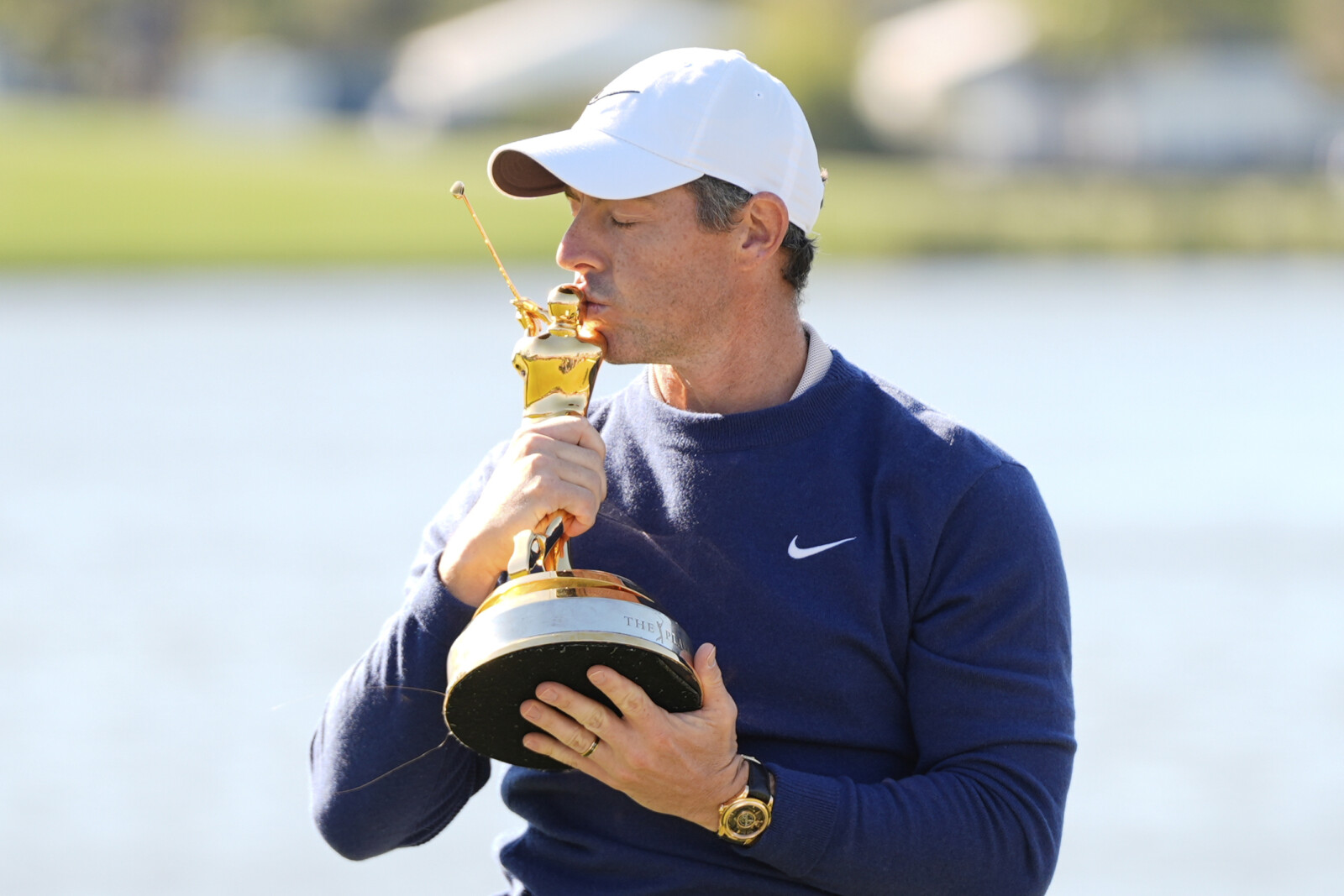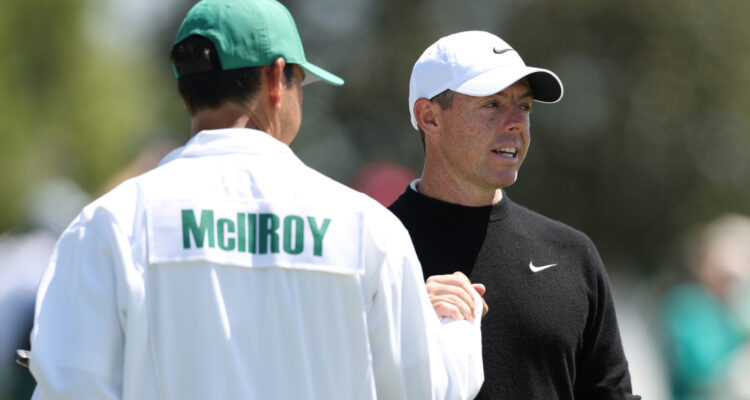RORY McILROY has had a great start to the season with two victories, the AT&T Pebble Beach and the TPC Sawgrass. Read his Pre-Masters Interview
Q. How have you prepared for this week, and how are you feeling coming into the tournament?
RORY McILROY: Yeah, feeling good. As you said, it’s been a nice way to start the year with the two victories at Pebble Beach and Sawgrass. Had a decent showing last time out when I played in Houston a couple weeks ago, had a good weekend, and then I’ve had a couple of visits up here, and that’s been — very glad to do that, especially with the weather yesterday.
So yeah, it’s been a really good sort of lead-in to it. Spent a week at home and had Michael Bannon over, and we were doing some practice and played quite a bit of golf and tried to stay as sharp as I could.
Yeah, it’s been a good week, and obviously looking forward to getting this thing going on Thursday.
Q. Any nagging issues with your elbow? At Sawgrass it was “The Devil Wears Prada” that got you in the mood —
RORY McILROY: In the mood for what?
Q. Anything planned for this week, similarly?
RORY McILROY: Elbow is good. Elbow is good. I got a little bit of treatment on it last week, and it’s all good.
Yeah, I’ve gotten into “Bridgerton” the last — I didn’t think I would. I was very against watching it, but Erica convinced me. So we’re on a bit of a “Bridgerton” kick this week, yeah.
Q. Six years ago you referenced Abe Lincoln, and it was basically talking about the impact of results and not to be damaged by setbacks as he had. How has that evolved, your position of looking on results as not necessarily successes or failures but merely outcomes?
RORY McILROY: Yeah, I think over the course of my career I think I’ve showed quite a lot of resilience from setbacks, and I feel like I’ve done the same again, especially post-June last year and the golf that I’ve played since then, and it’s something that I’m really proud of.
Look, you have setbacks and you have disappointments, but as long as you can learn from them and move forward and try to put those learnings into practice I feel like is very, very important. I feel like I’ve showed that quite a lot over the course of my career.
Look, when you have a long career like I have had, luckily, you sort of just learn to roll with the punches, the good times, the bad times, knowing that if you do the right work and you practice the right way, that those disappointments will turn into good times again pretty soon.
Q. You’ve been working with Bob Rotella for a bit. I’m curious in your words what he brings to the table for you, how valuable he’s been to you, and are there any ways you guys have shifted your approach or altered your approach leading into this week?
RORY McILROY: Yeah, not really. Look, I first met Bob back in 2010, so I’ve known him for quite a while, 15 years, and we’ve sort of — we’ve always chatted, even if we haven’t worked officially together. We’ve always kept in touch.
I think as Gary was saying there, talking about not getting too much into results and outcomes, we talk about trying to chase a feeling on the golf course. Like if you’re on the golf course, what way do you want to feel when you’re playing golf. That’s something that is a — it’s not something I obviously just do here, but I do every week that I compete. If I can chase that feeling and make that the important thing, then hopefully the golf will take care of itself.
Q. You’ve had many different versions of your approach to the preparation process for Augusta National. How did you land on this year’s iteration for the preparation process?
RORY McILROY: Yeah, I think it’s pretty similar for me over the years up until THE PLAYERS, and then you’ve got a decision to make. You’ve got three weeks leading up to this event, and it’s Tampa, Houston and San Antonio, three places that — I’ve played Tampa once. I’ve played San Antonio a few times, and that was the first time I’d played Houston at that particular golf course.
If this week wasn’t the week that it was, I’d probably take those three weeks off, but I knew that I needed to at least have one more competitive week leading in here. I opted for Houston rather than San Antonio just to change it up, more than anything else, bit of a change of scenery. But that was really it.
I try to prepare for this golf tournament pretty similarly to what I do most other weeks. I think because it’s a golf course we go back to every year, maybe there’s a little more knowledge that’s needed for certain shots, and definitely you’re going to face particular shots on this golf course that you don’t really face any other week of the year.
So coming up here a couple of times, doing a little bit more preparation on some of those shots on the golf course I think is important.
But once we get into the tournament week like now, you try to treat it the same and you just try to go through — basically check the boxes. I want to do certain things and I want to do my drills on the putting green and make sure I get my range sessions in just so that I’ve checked the boxes and feel as comfortable as I can going out there on Thursday morning.
Q. Do you recall coming here for the first time, and what you thought of how the golf course suited you and how that has evolved? Did you have sort of a feeling right away like wow, this is a place that I’m going to love, or did it take some time, and has that changed?
RORY McILROY: Yeah, I mean, look, I was just happy to be driving down Magnolia Lane. There was no thought of whether this was going to be good for me or bad for me. It was just an absolute thrill of a lifetime to drive down that lane at whatever it was, 19 years old, and be playing in my first Masters.
With how I hit the ball, especially back then, I hit the ball a lot more right to left back then, so I felt like it was a golf course tee to green that set up really well for me. And as everyone knows, this golf course is all about the around-the-green shots and on the greens and making sure that you’re comfortable with those.
But as I said, you’re going to face shots and putts on this golf course that you don’t necessarily face every other week of the year. So that’s where I think the most — that’s where the most thought and the most time has to be spent and just making sure that you’re comfortable on that part of the game.
I’ve always loved this course. I’ve always loved — people ask me, If you could only play one golf course for the rest of your life, what would it be? And I think walking around this place every day would be pretty cool.
Q. For many years now the narrative at this time of year is this could be Rory’s year. And given your start in 2025, now it’s this really could be Rory’s year. Does the pressure or expectation feel any different to you, and if so, how do you manage it?
RORY McILROY: No. It’s just narratives. It’s noise. It’s just trying to block out that noise as much as possible. I need to treat this tournament like all the other tournaments that I play throughout the year.
Look, I understand the narrative and the noise, and there’s a lot of anticipation and buildup coming into this tournament each and every year, but I just have to keep my head down and focus on my job.
Q. I want to go back to what you said about only playing this golf course for the rest of your life if you could only pick one. Why is this place so special to you?
RORY McILROY: There’s the history, those sort of spring evenings where I would sit down with my dad and watch this tournament. I think all that sort of comes back to me, as well. Remembering why I fell in love with the game.
I think it’s obviously just a beautiful place. I don’t think there’s a more beautiful golf course on earth. It’s like you’re playing golf in the prettiest park in the world basically. I think just for that.
But yeah, look, the history and everything that this club and this course means to the game of golf, I think all that goes into it. But it’s just a — you could spend all day out there and time would go by very quickly. I think that’s one of the big things.
Q. Rory, Collin Morikawa caught some criticism at THE PLAYERS for saying he owes the media nothing for having left Bay Hill early. You obviously caught some heat after doing that at Pinehurst. The conversation after something like that in comparison to other professional athletes, golfers can be a little more sensitive. I’m wondering if you think that’s a fair or unfair assessment.
RORY McILROY: Well, he’s right. Not that I think he could have worded it a little bit better, but look, every other athlete, whether it be in the NBA, NFL, they’re obligated to speak to you guys after a game. We’re not. Whether that’s something that the PGA TOUR looks to in terms of putting that into their rules and regulations, but as long as that’s not the case and we have that option to opt out whenever we want, expect guys to do that from time to time.
Q. You made a comment when you left THE PLAYERS on The Golf Channel set that you have to be willing to get your heartbroken, and you had a spell where you just didn’t want to do that. Why do you think that was, and what have you figured out about that?
RORY McILROY: I think it’s a self-preservation mechanism. We’re all — you don’t want to — yeah, I think it’s more — yeah, I don’t know. It’s just more of a thing where you’re trying to not put 100 percent of yourself out there because of that.
It happens in all walks of life. At a certain point in someone’s life, someone doesn’t want to fall in love because they don’t want to get their heart broken. People, I think, instinctually as human beings we hold back sometimes because of the fear of getting hurt, whether that’s a conscious decision or subconscious decision, and I think I was doing that on the golf course a little bit for a few years.
But I think once you go through that, once you go through those heartbreaks, as I call them, or disappointments, you get to a place where you remember how it feels and you wake up the next day and you’re like, yeah, life goes on, it’s not as bad as I thought it was going to be.
And I think that’s the — it’s going through those times, especially in recent memory, where the last few years I’ve had chances to win some of the biggest golf tournaments in the world and it hasn’t quite happened. But life moves on. You dust yourself off and you go again.
I think that’s why I’ve become a little more comfortable in laying everything out there and being somewhat vulnerable at times.
Q. Was that after St Andrews, after LA? Did you think the sun rose and you realized it?
RORY McILROY: No, I think it was after the 2019 season. I remember I’d had a great year. I’d won four times around the world. I’d won the FedExCup. I had my best statistical season ever. But I didn’t have a great season in the major championships. I sort of made a commitment to myself from 2020 onwards that these four weeks a year I was going to — I went through a time of like, well, I’ll just prepare and I’ll just do the same things I do for every other week of the year but knowing that they’re not every other week of the year.
Yeah, I made a commitment to myself to sort of earmark these a little bit more and to give a little bit more of myself in these weeks. And I think if you see my major record since 2020, COVID was a bit of a weird year, but 2020 up until now compared to, say, the five years previous when I won the PGA in ’14, I think you’ll see a big difference in that, and that was just sitting down and reflecting at the end of 2019 thinking that I need to approach these a little bit differently again.
Q. What have you seen in terms of the golf course and how it’s playing and in particular any tee shots where your approach might change a little because of the tree loss?
RORY McILROY: Yeah, so I played two Mondays ago, the Monday of Houston, and the course was — it was pretty fast, pretty firm. The members had just had their Jamboree tournament so the course was in great shape. It was dry. Probably a little more similar to hopefully how it’s going to play by this weekend. Then last Monday was a little soft and slow, probably what it’s like out there right now after the rain yesterday.
But yeah, I think that the biggest thing, I don’t think the course plays any differently. You’ve got the four new greens on 1, 8, 15 and 16, which I think everyone saw the ladies playing here on Saturday that those greens always are a little bit firmer, especially 15, for example, watching the balls shoot through that green.
But from a tee shot perspective, there are a couple tee shots that are maybe a little less visually intimidating, thinking like a tee shot like 10 with a little bit of that tree loss on the left side. Your target there is that sort of TV or that camera tower down there at the bottom of the hill. You used to not be able to see that, and now you can see that pretty clearly. Visually it looks like you don’t have to turn the ball as much as you used to.
There’s a little bit more room on the right side of 3 if you want to hit driver up there. There’s a couple overhanging trees that aren’t there anymore.
But really, apart from that, I think it’s pretty much the same. But definitely a couple of tee shots that look a little bit different.

Q. The fact that you and Shane are here and Ireland has not won a green jacket yet, and it’s obviously high on both of you guys’ lists, what does it mean or what do you think it could mean to Ireland if one of the two of you were able to get that?
RORY McILROY: Yeah, I don’t know. We went through a really nice period there from 2007 through 2014. Obviously you had Padraig winning the Opens and the PGA, had G-Mac winning at the U.S. Open at Pebble, Clarky at St. George’s, I went on my run and Shane did what he did in 2019 at Portrush.
We’ve had success in pretty recent memory. You’re sort of saying that one major may be worth a little bit more than the other majors. I don’t know. But it would be a pretty big deal, just like all the rest of them were.
Q. Is there a book that you’re reading this week or maybe heading into this week that you can share with us?
RORY McILROY: I for the first time in a long time am reading a novel. I actually got some fiction into my life. It’s a John Grisham book.
Q. Which one?
RORY McILROY: “The Reckoning.” It’s got off to a pretty good start. (Laughter.)
Q. A question about Bernhard Langer. With this being his last Masters, I was curious how you view his legacy as a pro.
RORY McILROY: Yeah, just amazing. Sort of like the Iron Man of golf. I’ve played with Bernhard a little bit. I played a couple of times with him in my rookie year on the European Tour in 2008, played with him in Germany, once, actually, which was really cool. And then I actually played with him in the third round of the 2020 Masters.
Yeah, I mean, he’s been amazing. Just what he’s been able to do on the Champions Tour — what he did in his regular career but especially what he’s done post-50, I think just to have that competitive spirit and have that competitive fire burn for so long, I don’t know if I would be able to do that.
But I think it’s unbelievably impressive. Hopefully he gets the send-off that he wants this week.
Q. Throughout the years through your highs and lows you have had various people to fall back on like Bob, Brad, Harry, but how important is Poppy becoming a part of the team, especially during the lows that you have to experience?
RORY McILROY: Yeah, look, it definitely makes the lows a little easier to take. But yeah, look, the highs are going to be high anyway, but it’s amazing — I think especially after THE PLAYERS, I think it was the first time that she sort of realized what I did, which was really cool. Also a little scary at the same time.
Yeah, look, it’s amazing that I can share these things with her and with Erica and — the day after THE PLAYERS, she went into school and there was a couple of kids that had said some stuff to her, and she came home to me that day and said, Daddy, are you famous? I said, It depends who you talk to. It’s a bit of a double-edged sword. You have to temper the expectations sometimes.
Yeah, look, as everyone knows that’s had children, it’s an amazing addition to life, and it’s great that she’s here this week.



